Recently, the College of Education for the Future of Beijing Normal University ( BNU) successfully hosted the 17th Future Education International Salon. The guest speaker for this event was Dr. Tore Hoel, a foreign expert of BNU and a senior researcher at Oslo Metropolitan University, Norway. He has been active in the field of international education standards development and educational technology research for decades and is a recognized and respected academic worldwide. Dr. Hoel gave a lecture entitled "Generative AI and ChatGPT: Implications, Capabilities, and Risks", followed by discussions with the faculty professors and students.
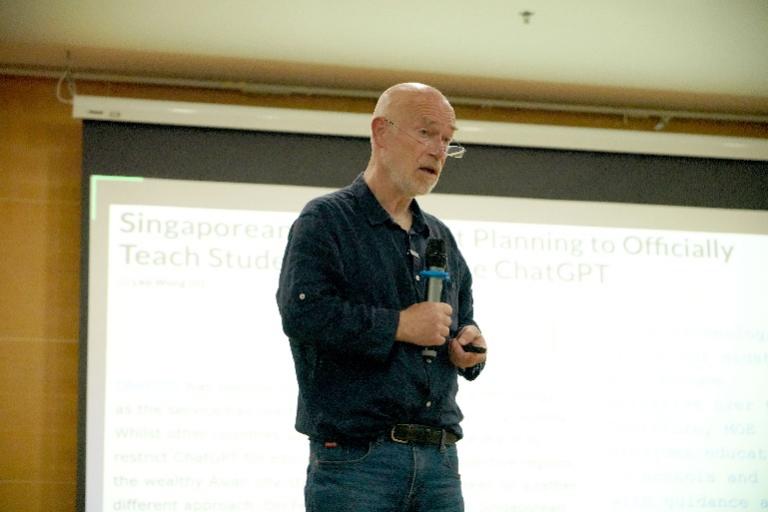
To begin with, Dr. Hoel introduced the theoretical foundations of generative AI. As a specific type of AI, generative AI is trained on a large-scale data set and uses machine learning algorithms to generate new content similar to the training data. ChatGPT is not an application, but a language generation model that focuses on conversation generation. It generates intelligent responses based on the user's text input. This response can be a short word or a long sentence. GPT stands for Generative Pre-trained Transformer.
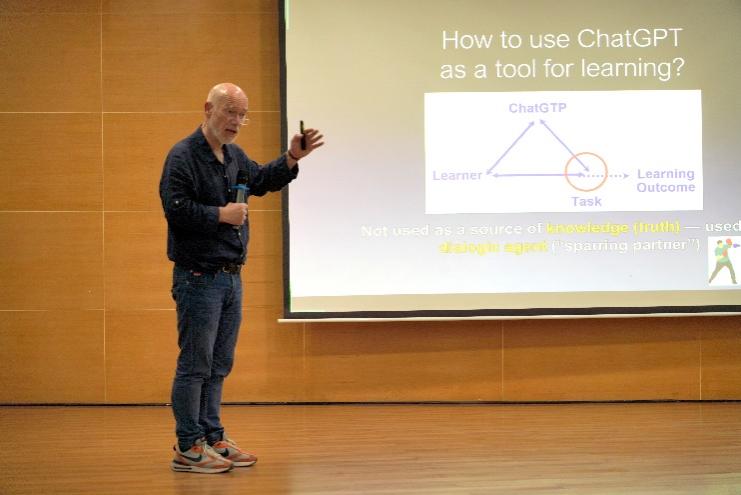
Later, Dr. Hoel introduced the wide applications of generative AI and ChatGPT in various fields such as healthcare, education and entertainment. Reinforcement learning based on human feedback (RLHF) is a new technology for training large language models (LLMs), which is crucial for OpenAI's ChatGPT model, Deep Mind's Sparrow model, Anthropic's Claude model and others. The expectation is that ChatGPT can greatly improve work efficiency and accuracy. In the education field, ChatGPT can automatically provide personalized learning support and feedback based on students' needs and learning situations, thereby improving students' learning outcomes. In the healthcare field, ChatGPT can help doctors with preliminary diagnosis and treatment suggestions, improving the accuracy of diagnosis and treatment. It has long been developing towards intelligence, and there are more possibilities for combining with ChatGPT, from content production to publishing and interaction, there is enormous room for improvement.
Dr. Hoel went on to discuss with students and faculty academics the ethical and legal issues surrounding the generation of generative AI. The application of generative AI in areas such as education and healthcare requires the processing of large amounts of personal information, making data security concerns an important issue to be addressed. Developers need to take effective measures to protect users' privacy and personal information from being violated. Generative AI may also infringe on the copyright or privacy of others, for example by using unauthorised or non-consensual data to train models or create content. Generative AI may also cause distorted or misleading information, for example by producing false or biased news or advertisements. These issues will inevitably harm the interests or rights of others, and will impact social order and public trust.
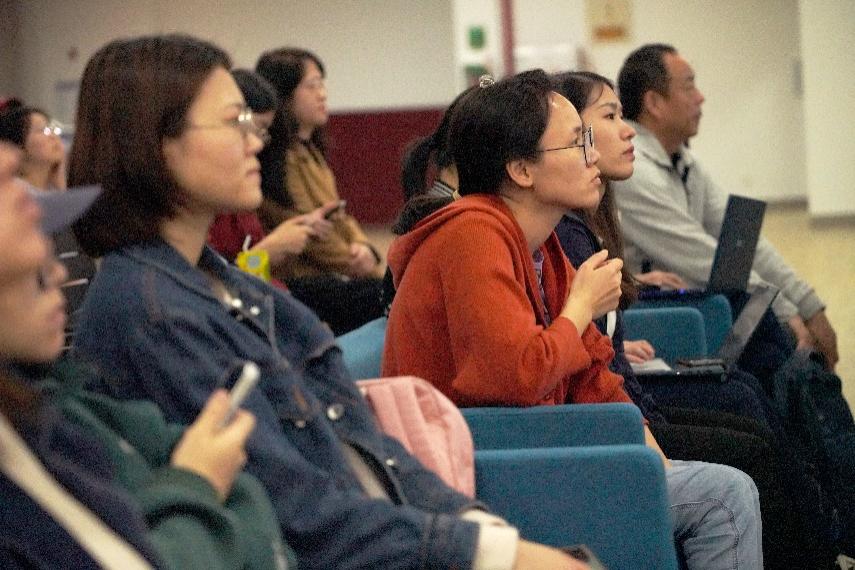
Dr. Hoel then pointed out that the rapid growth of ChatGPT has raised concerns among educators worldwide. These concerns focus on the potential decline of human interaction due to the increase in human-computer conversations. The use of ChatGPT by students for writing assignments and cheating, and the threats and challenges to writing instruction and essay writing as a form of assessment. Additionally, the misuse of ChatGPT in scientific research is a source of academic misconduct. In fact, the New York Board of Education in the US led the way in banning students from using ChatGPT on campus due to the potential proliferation for plagiarism of assignments with artificial intelligence (Elsen-Rooney, 2023). The University of Hong Kong has announced a ban on the use of ChatGPT or other artificial intelligence tools in all courses, assignments, and evaluations at HKU. Unless students obtain written permission, the use of such tools will be considered plagiarism by the university. In the face of the rapid development of generative AI technologies such as ChatGPT, how exactly should we rationalize the impact of ChatGPT on the way humans learn, live, and work? This is an important issue of the times for all who are involved in delivering education.
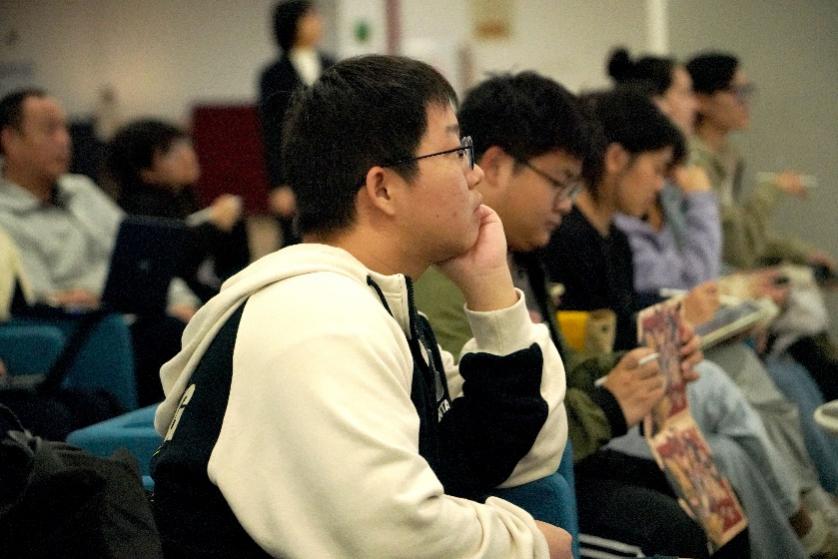
At the end of the event, Dr. Hoel combined his long-standing observations on the frontiers of learning technology with practical applications to show that generative AI, represented by ChatGPT, has a wide range of future applications in education and to discuss the impact of ChatGPT on education from an interdisciplinary perspective. Education should focus more on developing students' higher-order thinking skills, especially interdisciplinary multiple-thinking skills, critical thinking skills, and creative thinking skills. Only with strong interdisciplinary and multi-dimensional thinking skills will students be able to recognize and differentiate between complex problems and situations in the real world, and ultimately complete practical tasks that are difficult to handle with artificial intelligence.
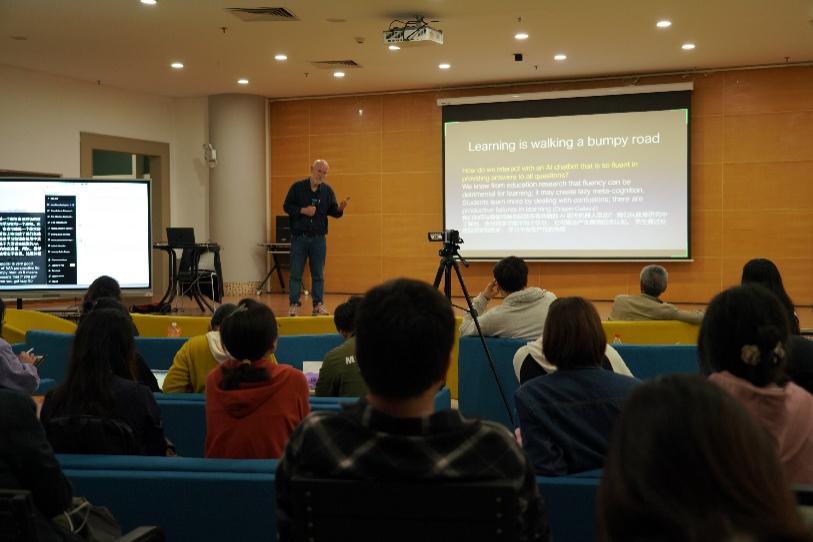
In the interactive session, students actively engaged with Dr. Hoel, asking questions about the impact of artificial intelligence on education, future teaching management models and future teacher education, etc. Dr. Hoel gave pertinent responses from a professional perspective based on his own research experience, resulting in the audience further deepening their understanding and experience of the current cutting-edge technology. It was an important guide for teacher trainees to open up new ideas for academic research, broaden their horizons in education research and stimulate their enthusiasm for teaching research. The on-site academic presence was impressive, and many students present expressed that they had benefited greatly from the presentation.


